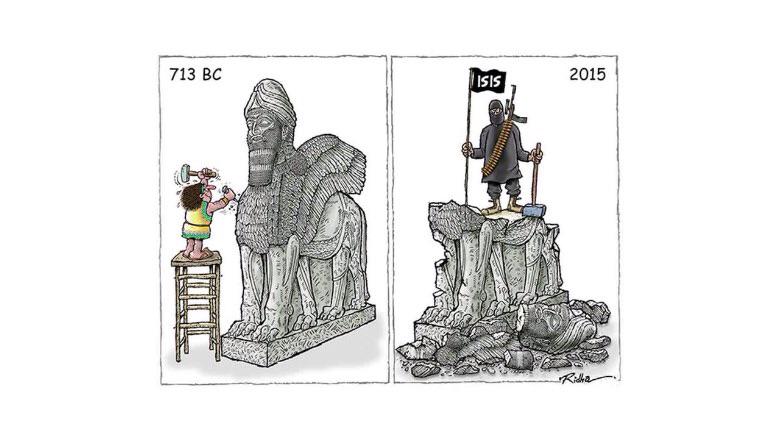Guest post by Leo Igwe.
Muhammadu Buhari promised to address, if elected to the office of the president, the widespread insecurity occasioned by Boko Haram in Northern Nigeria. Now he has been elected and sworn in as the president of the country, will he do that? I want to quickly point out that it would be a grave mistake if Buhari reduces the problem of insecurity in Northern Nigeria to the Boko Haram uprising. No it is not. Insecurity in Northern Nigeria is more than the violent campaign of these Islamic militants. Boko Haram is an offshoot of a vicious ideology that is pervasive in the region – that is radical Islam. The violent attacks by this jihadist group are just a tip of the iceberg of fanaticism and bigotry. They are the latest manifestations of the sinister infestation of radical Islam
So, will Buhari address the pervasive issue of Islamic extremism in Northern Nigeria? Or is he going to focus mainly on defeating Boko Haram militants in Sambisa forest when there are Boko Haramic elements across the region? Take for instance the state sponsored sharia police. There is overwhelming evidence that these sharia enforcement units in the northern states are abusing the rights of innocent citizens with impunity. They destroy the goods of traders, arrest those ‘attempting’ to perform gay marriage, and force Muslims to fast during Ramadan. Some days ago they called for the execution of blasphemers.
The leader of Hisbah, the sharia police in Kano, recently asked for capital punishment for 7 Tijjaniyya Muslims accused of blasphemy and of insulting pr. Mohammad. The leader of Hishbah, Sheikh Aminu Ibrahim Daurawa, issued a statement which reads:
After sufficient investigations against these corrupt and insensible apostates, adherents of Hakika, we have confirmed that they have insulted the prophet peace be upon him and Hishbah has began(sic) criminal proceedings against them. We have arrested some of them and we are looking for the rest for the immediate punishment of death as the Sharia, which is applicable in the State of Kano prescribes. May Allah curse whoever touches the profile of the messenger.
He further said in a message posted on his Facebook:
What these Tijjaniyya Sufis followers of Hakika did insulting the messenger is a far greater apostasy than that of the jews, Christians, Pharoah, Karun, Haman abd Abu Jahal and all other apostates walking the earth. Since the beginning of my days, investigating atrocities I have never seen one which equals this one, and this is the truth about Sufis.
A day after Sheikh Daurawa made these incendiary remarks, some Muslim youths rioted in Kano. They burnt down the house of the leader of the Tijjaniyya sect Mallam Abdul Nyass and set ablaze a local sharia court where Nyass was scheduled to appear for trial. If Mallam Nyass had appeared in court on that day, who knows what would have happened to him if they had brought him to court.
Unfortunately the Kano State government never issued a statement condemning this mindless violence and those who orchestrated it. The government and the Ulama did not express concerns over that statement which motivated the violent attacks. Sheikh Daurawa equated non-Muslims to apostates, which implied that those who professed non-Islamic faiths and beliefs were criminals. Apostasy is a crime punishable by death under sharia law.
Nobody has been arrested or is being prosecuted for arson or assault. If a Christian leader had issued such a statement calling Muslims apostates, some would have branded him an ‘’islamophobe’’.
There has been no pronouncement from the Emir of Kano, Muhammadu Sanusi 11, denouncing the abusive and criminal activities of the sharia police command in his Emirate. Why is the Emir of Kano silent over these unconstitutional activities of the group? What is he doing to stem the recklessness of the sharia police in his constituency? Is poverty responsible for the recent riots in Kano?
Meanwhile, nobody knows the fate of the sect leader of the Tijjaniyya, Malam Nyass. Will he ever be tried in a court of law that respects his right to freedom of expression? Or is he going to languish in detention?
I mean this is the same pattern of reacting and dealing with religious violence in Northern Nigeria. Victims are blamed or detained for their own safety while the perpetrators go scot-free. Nothing is done to bring to justice Muslim fanatics who kill, maim, or damage other people’s property in the name of Islam. This is definitely the trend that gave rise to Boko Haram.
President Muhammadu Buhari must do more to root it radical Islam and the sharia formations in Northern Nigeria. He must take urgent measures to protect the rights of Nigerians, both Muslims and non-Muslims, to freedom of speech, religion and belief as contained in the Nigerian constitution which he has sworn to uphold.
Buhari must act to guarantee equal citizenship for all Nigerians living anywhere in Nigeria.
Nobody should be treated as a second-class citizen in Kano or in any of the Muslim-majority states because of his or her religious belief or unbelief, so the molestation, intimidation and harassment of Nigerians in the name of sharia must cease. Muslims in Kano and in other parts of Northern Nigeria are knowledgeable enough to profess and practice their faith. They do not need a moral – sharia – police paid by taxpayers’ money to tell them how to live their lives.
Buhari must tackle radical Islam before radical Islam destroys Northern Nigeria and the rest of the country.
This is part of the change that Northern Nigeria urgently needs. President Buhari, will you deliver that change?
(This is a syndicated post. Read the original at FreeThoughtBlogs.)






